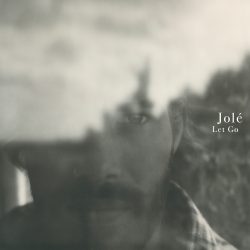A fine set of songs about loss and what you take from it.
 There’s a melancholy mood that runs through the six tracks on this EP from this singer/songwriter. That’s not surprising when you consider that the writing was triggered by the death of his, obviously beloved, grandmother (though only four of the tracks are directly accredited to the influence of this event). Despite the melancholia that runs through this recording the tracks are not overtly sad or depressing because, alongside the feelings of loss, Jolé mines a rich seam of hope and positivity around the themes of letting go and learning from experiences.
There’s a melancholy mood that runs through the six tracks on this EP from this singer/songwriter. That’s not surprising when you consider that the writing was triggered by the death of his, obviously beloved, grandmother (though only four of the tracks are directly accredited to the influence of this event). Despite the melancholia that runs through this recording the tracks are not overtly sad or depressing because, alongside the feelings of loss, Jolé mines a rich seam of hope and positivity around the themes of letting go and learning from experiences.
Josh Oliver, now calling himself Jolé, released his self-titled debut album in 2019. This E.P. is his second studio recording and, like so many projects at the moment, is linked with his experiences during the pandemic. It seems the lockdown periods, for him, were beneficial, as he had just established his own, London based, studio and the lockdowns gave him time to get to grips with self-producing as well as allowing time to write. During the period covered by the songs on this EP, he became a father, as well as losing two grandparents and it is interesting how you can see that fatherhood probably allowed him to put that sense of positivity into these sad songs that might otherwise have been quite bleak.
The E.P. opens with ‘This City’, the first single from the recording. This is one of the songs inspired by his grandmother’s death and deals with the surprise of visiting a city without the person who introduced you to it and who you associate it with. The tempo for the song is quite jaunty, kicking off with a strummed guitar and a piano riff that sound quite upbeat, but Jolé’s voice is not designed for jaunty and upbeat, it carries a melancholy all of its own. There’s quite a ‘new folk’ sound to this song and it sets the tone for the album. The songs are simple but quite heavily produced, with a lot of layering and carefully used effects. This is a well-constructed set of songs. It’s clear from this first song that Jolé’s connection to his lost grandparent is significant. She was, clearly, an important figure in his life.
The other songs, apparently, directly connected to the loss of his grandmother, are ‘Stay’, a song that addresses the need to deal with the fact that you want someone to stay with you but know they can’t. Also, ‘Talk’, a song about the need to communicate with someone who is no longer around. The song opens with the line “I wish I could call, just to see how you were doing” and it’s a pretty, sorrowful song that, again, refuses to let itself wallow in sadness. ‘Hopes’ is, pretty much, what it says on the tin. It’s a song about letting go and looking towards the positive, Jolé has described it as the “feeling of cutting yourself loose” and the track has a quite anthemic feel about it that borders on celebratory; that feeling of accepting a situation and knowing that it’s the right thing to do.
The remaining two tracks are ‘13’, a reminiscence on getting older, and ‘Let Go’, the closing track, about the realisation that holding on to bad feelings serves no useful purpose and you need to move on. “Now I let go, I can let go. Finally, I feel like myself again”. Slightly ironically, this sounds like it should’ve been associated with the loss of a relative but is more ambiguous, reflecting on the loss of a loved one, whether through a break-up or an actual passing.
These are all good songs, well performed and Jolé has a voice full of character and one that is very good at conveying a sense of loss but with just that hint of better things to come. This is a very assured recording and suggests that Jolé is going places as a singer and songwriter. His previous recording drew comparisons to Sufjan Stevens and it’s easy to see why, with his clear vision of how his songs need to sound and his deft touch in the recording studio.
There is, however, a downside and it’s more to do with the limitations of the format he’s gone for this time round. An E.P. is a limited enough time to get to know an artist and their material. When that limitation is further compounded by selecting a theme for the recording that limits the scope of the songs then you get quite a one-dimensional image of the artist and what they are capable of. Jolé absolutely nails the sad song with a hint of redemption in its lyrics, there can be no doubt of that. Whether he can as convincingly sing about love, hate, humour, even the everyday, remains to be seen. This is an excellent EP, but you don’t come away from it feeling you know anything about its creator other than the fact he can deal with loss. You don’t feel like you know Jolé, and that’s unfortunate, because he sounds like an artist you might want to know a lot more about.


